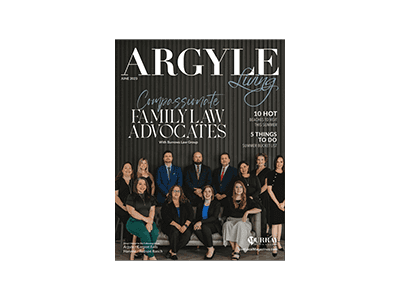




Flower Mound Child Custody Solutions for Your Family
Burrows Law Group: Your Trusted Partner in Custody Matters
Custody cases are some of the most emotional and stressful to deal with. When divorcing or separating from your child's other parent, your primary concern is your child's well-being. You likely have a lot of questions and may be feeling isolated. You are not alone in this. It is not uncommon for parents to experience intense anxiety while going through a custody battle. At Burrows Law Group, we know how challenging this process is for you, and we are committed to helping our clients protect their families during this difficult time.
To discuss your custody matter with a dedicated Flower Mound custody attorney, call Burrows Law Group at (972) 236-7798 or send us a message online.
Key Insights on Child Custody in Texas
In Texas, child custody is legally referred to as "conservatorship," and parents are "custodians." Conservatorship refers to the parents' rights to make important child-rearing decisions, such as those regarding education, religious upbringing, health care, and the child's general welfare. There are two types of conservatorship: joint managing conservatorship and sole managing conservatorship.
When parents are awarded joint managing conservatorship, they will work together to make most decisions for their shared child. Typically, in these cases, the custodial parent is awarded final decision making regarding where the child lives, while the noncustodial parent receives visitation. However, there are situations in which neither parent is given the final say in where the child lives. Instead, the courts restrict the child to living in a specified geographic area, such as a specific school district.
When one parent is awarded sole managing conservatorship, they alone have the right to make decisions about the child. Sole managing conservatorship is not granted lightly, and the courts take it under careful consideration.
Conditions for Sole Managing Conservatorship:
- There have been instances of domestic violence
- There have been instances of neglect
- One parent is struggling with alcohol or drug addiction
- One parent is absent from the child's life
In cases where one parent is awarded sole managing conservatorship, the other parent is typically named a possessory conservator. In cases where a nonparent is named the child's sole managing conservator, both parents will be named possessory conservators. Possessory conservators usually retain their parental rights, but they do not have final decision-making authority.
Understanding Child Possession & Visitation Orders
In Texas, visitation is legally referred to as "possession." When parents divorce or separate, they will receive a possession order as part of the custody process. As noted in the Texas Family Code Sec. 153.002, the court's primary consideration when making conservatorship and possession decisions should always be the child's best interest.
According to Texas law, under a standard possession order, "the parties may have possession of the child at times mutually agreed to in advance by the parties." When parents disagree, the noncustodial parent is awarded visitation based on the standard possession order schedules outlined in the Texas Family Code.
Factors Influencing Child Possession and Visitation Orders:
- The age of the child
- The relationship each parent has with the child
- The child's relationship with any siblings or other family members
- The parents' ability to provide a safe, stable home environment for the child
- Where the parents live
- Where the child goes to school
- Any existing special needs of the child
- The parent's work schedules and responsibilities
- If there is a history of domestic violence
- The parents' ability to co-parent effectively
In addition to standard possession, there are also modified possession orders, possession orders for children under three, and supervised possession orders. To find out what type of possession order is most appropriate for your family and situation, reach out to one of our child custody attorneys.
Contact Our Attorneys for Compassionate Legal Support
If you live in Flower Mound and need help with a custody matter, we are here for you. In addition to being available to answer any questions you may have, our child custody attorneys offer rigorous-yet-caring legal representation in all custody and visitation matters. From helping you establish visitation after a difficult divorce to assisting fathers in protecting their parental rights, Burrows Law Group is standing by to provide personalized legal services that put you and your family first.
Call our law firm at (972) 236-7798 or send us a message online to discuss your custody needs today.
An Experienced Team
You Can Trust
-
 Adam Burrows Managing Attorney, President & CEO
Adam Burrows Managing Attorney, President & CEO- Family Law,
- Child Custody,
- Divorce,
- Modifications,
- Prenuptial Agreements,
- Property Division,
- Restraining Orders,
- Same Sex Marriage,
- Small Business Formation
-
 Dr. Jessica Burrows In-house Counselor & CFO
Dr. Jessica Burrows In-house Counselor & CFO -
 Daniel Dower Senior Associate Attorney
Daniel Dower Senior Associate Attorney- Family Law,
- Child Custody,
- Divorce,
- Modifications,
- Prenuptial Agreements,
- Property Division,
- Restraining Orders,
- Same Sex Marriage,
- Small Business Formation
-
 Jennifer Hicks Senior Attorney
Jennifer Hicks Senior Attorney- Family Law,
- Child Custody,
- Divorce,
- Modifications,
- Prenuptial Agreements,
- Property Division,
- Restraining Orders,
- Same Sex Marriage
-
 Brielle Roderick-Badoy Senior Associate Attorney
Brielle Roderick-Badoy Senior Associate Attorney- Family Law,
- Child Custody,
- Divorce,
- Modifications,
- Prenuptial Agreements,
- Property Division,
- Restraining Orders,
- Same Sex Marriage
-
 Hollie Ritchie Associate Attorney
Hollie Ritchie Associate Attorney- Family Law,
- Estate Planning,
- Child Custody,
- Divorce,
- Modifications,
- Prenuptial Agreements,
- Property Division,
- Restraining Orders,
- Same Sex Marriage
-
 Vanita Aphan-Kirkland Senior Attorney
Vanita Aphan-Kirkland Senior Attorney- Family Law,
- Child Custody,
- Divorce,
- Modifications,
- Prenuptial Agreements,
- Property Division,
- Restraining Orders,
- Same Sex Marriage
-
 Dale A. Burrows Founder & Of-Counsel
Dale A. Burrows Founder & Of-Counsel- Family Law
-
 Melissa Ruden Board Certified Paralegal
Melissa Ruden Board Certified Paralegal -
 Lily Lord Senior Paralegal
Lily Lord Senior Paralegal -
 Madison Duehr Senior Paralegal
Madison Duehr Senior Paralegal -
 Christian Mathis Firm Administrator & Intake Specialist
Christian Mathis Firm Administrator & Intake Specialist -
 Jennifer Mulford Administrative Assistant & Billing Coordinator
Jennifer Mulford Administrative Assistant & Billing Coordinator
.2509041016024.png)
.2509041014128.png)




































